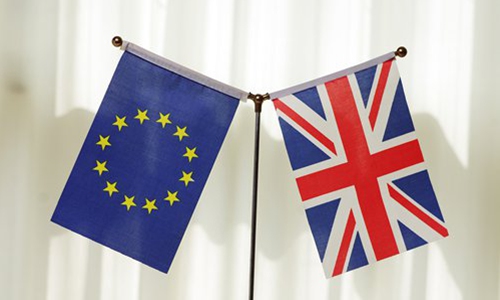HOME >> OPINION
Which future for the European Union?
By Christian Lequesne Source:Global Times Published: 2020/1/15 20:18:40

Photo: IC
On January 31, the UK will formally leave the European Union. It is the first time in the history of the EU that a member state decides to exit. The decision is the result of a referendum which was adopted by the British citizens three and a half years ago.
All other EU member states regret this British decision, which had no domino effect. At the opposite, all opinion polls show that no remaining EU member states, except Czech Republic, have a majority of its people in favor of leaving the EU. The difficult debates on Brexit in the UK had a clear effect on the membership of the other EU states.
The reluctance to follow the British scenario does not mean that the public opinions are happy with the EU. In all EU member states, except perhaps the small and rich Luxembourg, Eurosceptic parties at the right and the left of the political spectrum criticize the EU rules.
The reasons to be Eurosceptic are not identical all over the EU. There are strong national declinations. In some member states, Eurosceptic parties castigate the EU for being too regulatory; in others, they refuse an EU which is too neoliberal; finally, some oppose the cultural model of society that sustains the EU, made of tolerance, permissiveness, and multiculturalism with open borders. In countries as Poland or Hungary, the main opponents to the EU, who are at government right now, consider that the EU has brought the wrong values to their societies.
Despite these turbulences, the EU still exists and will remain. The main achievements of the EU are its single market, single currency (the Euro) and trade policy. Every member state is benefiting from these economic rules and that explains why, beyond the Brexit case, other member states do not want to leave the boat.
The key question for the future is: will the EU (possibly enlarged to new member states of the West Balkans) remain mostly an economic institution and will it reinforce its political unity? The answer is uncertain if we consider the debates in most of the EU member states. The main risk for the future of the EU is not to collapse or to disappear but to remain only a market organization.
Some changes in the international system have however a dynamic effect on the politicization of the EU, especially in the field of defense. Currently, European security remains based on the post World War II rules. Most (not all) of the EU member states are also members of NATO and expect an American security guarantee.
However, Europeans have more and more to accept since former US president Barack Obama that the US is less interested in securitizing Europe. The election of Donald Trump has decoupled the feeling of uncertainty within the EU.
This fundamental change in the transatlantic relationship is an incentive for the EU to think more about its strategic autonomy in the defense field. With Brexit, the EU is losing a key actor in the defense field. For this reason, France's wish consists in maintaining close ad hoc relations with the UK in the military field. It is more difficult to push other member states, as Germany, to invest in the defense sector to reach a real strategic autonomy.
In the EU, security attitudes remain very influenced by the transatlantic model. It is the case in Germany and even more in former Communist countries such as Poland and the Baltic States.
Regarding China, the EU is in a situation where it has decided to be pragmatic. China is not only a major economic partner of the EU, but also an economic competitor in areas such as Central Asia and Africa. In trade terms, the interest of the EU is to have a unified Chinese policy to obtain more market opening and fair trade competition. It is not easy for the EU to have a unified Chinese policy as China has bilateral relationships with each member state of the EU which do not always go in the same direction. For example, some member states participate in the Belt and Road Initiative and some do not.
Regarding the functioning of the international rules, the interest of the EU to maintain the status quo still makes it close from the US. It explains why China still perceives the existence of a West made of Europe and the US, even if the transatlantic relationship is less solid than it was in the 1990s.
The author is a leading specialist of EU politics in France. He is professor of political science at Sciences Po Paris. opinion@globaltimes.com.cn
Posted in: VIEWPOINT